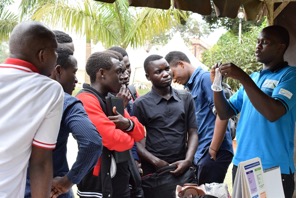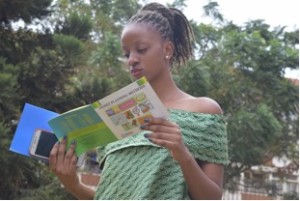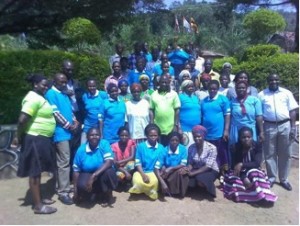Integrating Reproductive Health into Climate Change Efforts
Apr 8th, 2018 | By admin | Category: Climate Change, FeaturedBy Joshua Mirondo, guest blogger for Transition Earth.
Uganda is a very young country. Young people below the age of 30 constitute over 75% of the nation’s population and eight million are youth aged 15-30. About 25% of these are in institutions of higher learning like universities and vocational technical institutes.
Research shows that almost 95% of youth in these institutions are sexually active with only 25% using condoms and 45% using a modern contraceptive, while about 30% lack correct knowledge on family planning and contraceptives. The uptake of contraceptives by youth in these institutions is still very low due to negative community perceptions on sexual and reproductive health services that are associated with immorality and promiscuity. And sometimes, youth cannot afford the services. The unmet need for family planning keeps on widening the service gap for these young people; hence the importance of increasing access to family planning information and methods among youth.
Getting the Word Out on Reproductive Health & Rights
To address this need, Pearl Generation, a youth-led non-governmental organization, organized a health caravan called ‘The University Health Tour.’ This was aimed at reaching out to university students and people around these institutions in Kampala with sexual and reproductive health and rights (SRHR) services. Most of the services were free and those that weren’t were subsidized to favor the students. The universities involved included: Uganda Institute of Information and Communications Technology (UICT), Makerere University Kampala, Makerere University Business School (MUBS) and Kyambogo University (KYU) – in total, over 500 students were reached.
Several partners were brought on board to provide services, including Reproductive Health Uganda, Nakasero Blood Bank, Kawaala Health Center and Cambridge Medical Health Center. Peer educators from Reproductive Health Uganda carried out a number of sessions with young people. Each session took a participatory and youth-centered learning course to enable participants to acquire SRHR information that they would also disseminate to fellow peers. There was also a special focus on building positive attitudes towards family planning and other sexual and reproductive health services. University youth were targeted because they are in a reproductive age and thus availing them with this information helps them to make informed decisions.

A peer educator carrying out a group session on condom use focusing on male involvement in family planning with students of UICT
Disseminating information on family planning can also be a way of curbing the issue of a growing population that has become a threat to the environment, especially if tagged with access to information on other SRHR services; for instance, ensuring quality education for both girl and boy child and economic empowerment through financial literacy.
From Urban to Rural – The Need to Work Outside Cities
The targeted universities are in Kampala, a major urban area. Just like the urban dwellers, rural people, too, need such information so that the country can collectively adapt knowledge to mitigate the effects of climate change. Reproductive Health Uganda also reaches rural areas with SRHR information. For example, Bududa is a remote area found in eastern Uganda, on the slopes of Mount Elgon. It is characterized by high population growth and has suffered enormous mudslides in nearby villages (Marobo and Shikhuyu in Buluchecke Sub-county and Nabutsasi in Bumayoka Sub-county). Over 1,000 people have been affected, and property worth millions of Ugandan shillings has been destroyed in the previous years.
This area is also known for having Arabica coffee, which is a source of employment for the local people. However, the poverty levels are extremely high – much of the causes are attributed to high unemployment rates and mudslides that have simultaneously claimed people’s lives and property. This spurred the government of Uganda to relocate these people to other places as a strategy of saving lives. Nevertheless, due to strong cultural attachments, this effort has time and again been turned down by the communities, who prefer to stay and endure whatever comes along. The issue has therefore been recurrent for countless times in the previous years, prompting many non-government organizations to get involved and offer problem-solving ideas to the local people.
Due to its remoteness, there is an information gap among the people of Bududa. People do not have access to vital material that can help them adapt to climate change. Because of this, Reproductive Health Uganda organized a 5-day training of SRHR/Family Planning & Climate Change champions within the landslide-affected communities. A total of 45 persons, including Village Health Teams (VHT), farmers, youth, women and local leaders were equipped with skills and knowledge about the importance of family planning and environmental protection synergies as an avenue to combat re-occurrence of landslides. This resulted in increased local support for SRHR and family planning services, which is crucial to affect change in rural areas.
The Result? Positive Change
The SRHR/Family Planning champions in Bududa were equipped with teaching aids, as well as connected to the Reproductive Health Uganda district-based clinic, alongside other public health facilities. As a result of their efforts, the organization has registered increased numbers of people reached with SRHR/FP information and services. There has been a positive behavioral change among the communities, with a key indicator being increased numbers of people taking advantage of contraceptive services.
The champions have also become the lead change agents in advancing community empowerment in addressing the concerns of environmental degradation. Since the area is prone to landslides, continued degradation is only worsening the effects of climate change. To change this, the local champions often organized ‘sensitization’ sessions within their communities to design and create awareness of the dangers of improper land use, as well as to come up with mitigation strategies. Key areas of focus included the promotion of best agricultural practices, making local brochettes and energy saving synergies. This intervention came at a critical time, as deforestation rates are increasing due to local energy needs; therefore local brochettes can be a substitute for firewood.
With prevailing SRHR challenges – especially the unmet need of contraception – there is a call for increased stakeholder involvement to help people get access to this information and understand the links between reproductive health and the environment. “Family planning is crucial in multiplying water resources,” a quote from new vision a Ugandan newspaper.
Joshua Mirondo is a volunteer at Reproductive Health Uganda (RHU) Kampala branch. He is an advocate for young people’s Sexual and Reproductive Health and Rights, (SRHR), a youth social media manager, and youth trainer with RHU. In Josh’s own words – “I am very passionate about writing and use of social media platforms for advocacy. Key among the online campaigns managed include #youthconnect, which is aimed at using new media to reach out to young people with SRHR messages as a way of empowering them to become and make rightful decisions for a health Sexual Reproductive life, #ugschoolhealthpolicy, and #idecide, among others. I also hold a Bachelor’s degree in Public Administration and Management from Uganda Christian University.”


